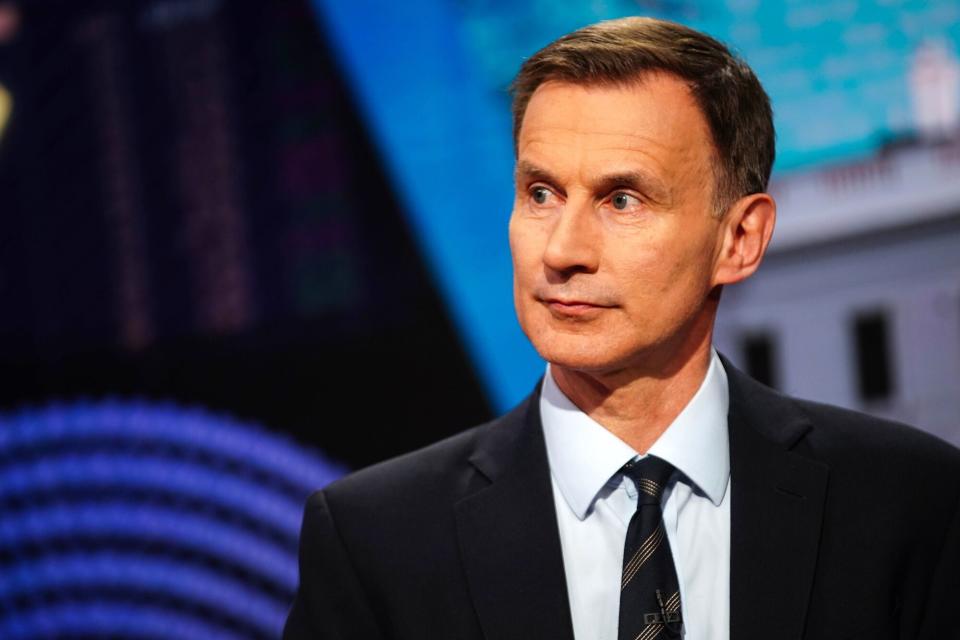UK’s Hunt Has No Money For a Pre-Election Giveaway, NIESR Says
(Bloomberg) -- UK Chancellor of the Exchequer Jeremy Hunt will need to raise taxes to meet his fiscal rules as weak growth and sticky inflation punch a hole in the public finances, according to new research.
Most Read from Bloomberg
Microsoft’s Xbox Is Planning More Cuts After Studio Closings
Marjorie Taylor Greene Finally Got What She Deserved: Defeat
Apple Apologizes for iPad Pro Ad, Scraps Plan to Air It on TV
The analysis by the National Institute for Economic and Social Research will make disappointing reading for Hunt, who has signalled he wants to cut property and payroll taxes to give the ruling Conservatives a boost ahead of a general election that opinion polls suggest the party is on course to lose.
NIESR’s forecasts, which use a similar model to the Treasury, show that tight monetary and fiscal policy will squeeze growth and leave Hunt needing to find more money to balance the books.
The Bank of England will cut interest rates twice this year to 4.75% from 5.25% as it brings borrowing costs down more slowly than the US Federal Reserve, NIESR said. It expects just two more rates cuts in 2025. It was not all bad news for Hunt, however.
The chancellor has said he would like one final fiscal event before the election, which he has hinted could be held as early as October when improving economic conditions may deliver a “feelgood factor” for households. In a boost to those hopes, NIESR said inflation will drop to the 2% target in the three months to June and there will be a 6% surge in living standards this year.
“We are seeing a recovery in living standards,” deputy director for public policy Adrian Pabst said. “That is good news.”
Faced with unpalatable options, Hunt should scrap his fiscal rules, which require debt to be falling as a share of GDP in five years, and replace them with a longer-term framework that allows more public investment or an end to fiscal drag caused by frozen income-tax thresholds, NIESR said.
Tax Rises
“The tax increase only has to happen if you accept the current fiscal rules,” Pabst said.
Stephen Millard, deputy director for macroeconomic modelling, did not reveal how big NIESR expects the fiscal hole to be but said the chancellor would need to raise “a penny or two or three on income tax,” suggesting he may need as much as £20 billion ($25 billion). Hunt had £8.9 billion of headroom at the March budget.
The institute forecast growth of 0.4% this year and 0.8% in 2025, even worse than last week’s bleak projections from the Organisation for Economic Cooperation and Development, which put the UK at the bottom of the Group of Seven nations next year.
After inflation drops to 2% in April, it picks up as underlying wage and services prices remain elevated. Inflation returns to the 2% target slowly and only by cutting rates gradually. Rates fall to NIESR’s estimate of the equilibrium level of 3.25% in 2027.
Pabst added that the rise in living standards this year will be “uneven,” with the lowest income households suffering another squeeze due to fast-rising rents, which are outpacing even the near-10% rise in the minimum wage.
He added that there had been “no evidence of regional regeneration” as levelling-up has failed. Output in the UK regions has fallen further behind London since 2019 and the Midlands has yet to recover to pre-pandemic levels of income and employment.
Most Read from Bloomberg Businessweek
‘It’s a Money Loser’: Tax Breaks for Data Centers Are Under Fire
A New Kind of Power Company Will Put a Battery in Every Home
©2024 Bloomberg L.P.




